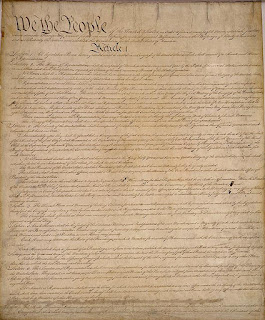Citizens often ask me "When did all this voter suppression stuff start? Who started it? Why?" Well, here is a short clip which answers those questions--somewhat.
"The definition of the right of suffrage is very justly regarded as a fundamental article of republican government. It was incumbent on the convention, therefore, to define and establish this right in the Constitution. To have left it open for the occasional regulation of the Congress, would have been improper for the reason just mentioned. To have submitted it to the legislative discretion of the States, would have been improper for the same reason; and for the additional reason that it would have rendered (IT) too dependent on the State governments that branch of the federal government which ought to be dependent on the people alone."
James Madison, writing as Publius
The Federalist Papers
James Madison
One of the many considerations our founders had to do long and arduous battle with (and well before the publication of the document just below) was intricately tied to the question this series of broadcasts asks. We wrestle with it still today.
If we understand who citizen is, what then are their privileges, duties, obligations, responsibilities, and/or honors?
As one can deduce by taking the five minutes necessary to read Madison's initial (not final, by any means) presumptive explanation of why this question is fundamental to the definition of citizen, we can see at least three (3) sides to this most heated (and oft violent) inquiry.
Who, then has the right bestowed upon them to vote? When is it proper to withhold that right from citizen? Under what circumstances? To what (if any) degree? For what period of time? Can this right be removed for any citizen, or for all citizens?
More than any other First Amendment right (each mentioned one time only), the right to vote is mentioned in the (current) Constitution. This right was first embodied in the 14th Amendment, passed on July 28, 1868. The relevant portion reads:
"S
Fourteenth Amendment
Section 2
U S Constitution
Fifteenth Amendment
Fifteenth Amendment
Section 1
Proposed February 26, 1869
Ratified February 3, 1870
This right would appear three additional times in the (current construct of) the Constitution, to prohibit the abridgment of the right, as a constitutionally protected right of the citizen, and the granting of suffrage to women.
While it may be a bit difficult to understand in this age of "instant access to everything" that such actions took a rather significant amount of time to accomplish such a feat, still it is quite interesting to look at the span of time between proposal and ratification listed above. Even after the conclusion of the Civil War in America, extremely "hot" debate raged over this very issue.
We have a very long, sad, painful and sordid history of attempts (many successful, for at least a time) to do precisely what the Constitution forbids (prohibiting citizen from voting), is this still an issue in 2018?
There are many who would (including the US Supreme Court as of last week!) say that yes, it really IS still an intensely debated and aggravating issue in 2018. This week's "theme" seems to be this very issue, as three significant cases from Texas (2 redistricting arguments), Ohio (voter removal from rolls), and a decision on a North Carolina case (requiring the state to re-district itself) are on the docket. (See our Resources Page for links, and some really interesting information on the entire topic for today's show.)
From before our founding as a nation to current day, the right to vote has been protected and/or (depending on the lens you use) prohibited, infringed, or otherwise capitulated virtually non-stop in the American experiment.
Perhaps most troubling is the reality that most American citizens are completely unaware of this reality. Furthermore, they the many are not even certain whether or not they are, individually, specifically both registered and qualified to vote in 2018 elections.
This episode of PPTS looks at both historic and current examples of both the attack on voting rights in America, as well as the brave souls who are today fighting to preserve this right, eliminating voter suppression, voting fraud, and the rolling back of this fundamental definition of what a particular right of citizen actually is.
You are invited to join us this Sunday, from 2-4PM (US Central Time) and call in with your story. What is the situation in YOUR State, YOUR town? Have you been the victim of voter suppression? What did YOU DO about it?
You can, as always, join us in the chat room by going to the bottom of the episode page and logging in. I hope to facilitate a lively episode.
I really hope YOU will listen, and DO something about it.
We're on the air! I'll see YOU there!
For the entire team,
Bud
The Tennessee Progressive


No comments:
Post a Comment